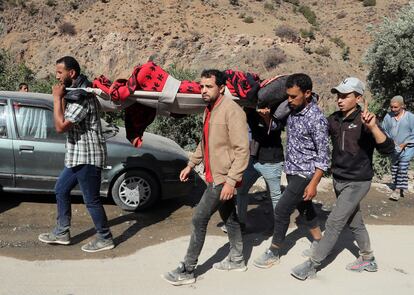King’s absence slows down response to the biggest earthquake in Morocco’s history
The government is showing no clear initiative as it awaits the monarch’s instructions, while civil society and the military continue to lead the aid effort


The hyper-centralized power apparatus in Morocco — which converges at the apex on King Mohammed VI, a constitutional sovereign who nevertheless enjoys very broad powers — is hampering the country’s response to its most devastating earthquake on record, one that has killed nearly 3,000 people and injured over 5,000 in the impoverished Atlas region to the south. The government seems to be without initiative, awaiting instructions from a monarch who has only appeared in public twice — on Saturday afternoon, upon his return to Rabat from a private trip to Paris, and late on Tuesday in Marrakech.
Civil society, which has rushed to send urgent aid to the victims, and the army, which has deployed all its logistical muscle, have so far led the response to the natural disaster, in stark contrast with the image of semi-paralysis offered by the government of Prime Minister Aziz Akhannouch.
On Tuesday afternoon — the fourth day after the earthquake and the third since his return to Morocco — Mohammed VI visited the hospital that bears his name in Marrakech, where he donated blood and spoke with some of the patients, as reported by the state news agency MAP. The head of state arrived in a long motorcade of official and security vehicles, leading to traffic cuts in the city’s main arteries. In 2004, another earthquake caused more than 600 deaths in Al Hoceima, in the north of the country. The king, who had been crowned in 1999 upon the death of his father Hassan II, traveled almost immediately to the site of the quake to visit the victims.
“The Al Hoceima regional hospital is already finished, but it cannot be inaugurated until the king comes to cut the ribbon,” revealed a left-wing political activist in the Rif, in the north of Morocco, speaking on condition of anonymity last week. Coinciding with his 60th birthday on August 21, Mohammed VI spent the end of his summer vacation at his summer residence in Al Hoceima, after spending time in Tetouan and Mdiq and before traveling on September 1 to the French capital, where he owns a luxury home. The sovereign did not show up at the Al Hoceima hospital to inaugurate it. Yet in the country’s public opinion, criticism of the king is non-existent.
Hospitals waiting to be inaugurated
Almost nothing gets done in the Moroccan administration without first receiving the blessings of the monarch, usually defined as “high royal instructions.” The large complex of the Tangier University Hospital Center, the most modern in the North African country, had to wait until late April before officially opening its doors. That is when the monarch toured the facilities, which according to the Moroccan media had been ready for several months.
Despite the constitutional reform of 2011, in which he made some concessions to the pressure from the popular movement of February 20, which emerged in the wake of the Arab Spring, the king of Morocco is a head of state with much more executive functions than ceremonial ones. He appoints the head of government with the most parliamentary support, but he also directly influences the balance of the coalitions inside the legislative chambers through the so-called independent parties, loyal to the monarch. His broad powers are concentrated above all on his direct appointment of the heads of the Ministries of Defense, Interior and Foreign Affairs. He also holds the religious title of Commander of the Faithful, which gives him great influence over a largely conservative and religious society.
The government of Morocco, which had initially remained silent after the earthquake that shook the south of the country on Friday, held an emergency meeting on Sunday afternoon. “From the first seconds this devastating earthquake occurred, and following the instructions of His Royal Majesty, all civil and military authorities and medical staff have worked on a swift and effective intervention to rescue the victims,” said the government spokesman Mustapha Baitas on Monday night. Prime Minister Akhannouch also attended a meeting on the same matter on Saturday afternoon at the Royal Palace in Rabat, where Mohammed VI had just returned to chair a working session on the earthquake and its consequences on the population.
On Monday, Akhannouch chaired an inter-ministerial committee to coordinate aid, announcing that the government will offer financial aid to rebuild or repair homes that have been razed or damaged. The head of government assured that the 50 school buildings destroyed by the earthquake will also be rebuilt. However, dozens of towns and villages have had to face the aftermath of the earthquake with their own resources, assisted only by shipments of humanitarian aid from associations and citizens from all over the country who traveled with their vehicles to help the victims.
The Ministry of the Interior, the only state department whose voice has been heard through its periodic victim reports, specified that Morocco has only responded favorably to the offers of help made by four “friendly countries”: two in Europe (Spain and the United Kingdom) and two more in the Arab world (United Arab Emirates and Qatar).
Spain’s Military Emergency Unit (UME) has already been deployed in the city of Amizmiz (28 miles south of Marrakech), in a military compound that it shares with Britain’s own rescue unit. Countries such as France, the United States, India and Israel have so far seen their offers rejected. Nearly 100 countries have offered the Moroccan government help with rescue and aid tasks. The authorities assure that they are first carrying out a “precise assessment of the needs on the ground” to avoid a “lack of coordination.”
Sign up for our weekly newsletter to get more English-language news coverage from EL PAÍS USA Edition
Tu suscripción se está usando en otro dispositivo
¿Quieres añadir otro usuario a tu suscripción?
Si continúas leyendo en este dispositivo, no se podrá leer en el otro.
FlechaTu suscripción se está usando en otro dispositivo y solo puedes acceder a EL PAÍS desde un dispositivo a la vez.
Si quieres compartir tu cuenta, cambia tu suscripción a la modalidad Premium, así podrás añadir otro usuario. Cada uno accederá con su propia cuenta de email, lo que os permitirá personalizar vuestra experiencia en EL PAÍS.
¿Tienes una suscripción de empresa? Accede aquí para contratar más cuentas.
En el caso de no saber quién está usando tu cuenta, te recomendamos cambiar tu contraseña aquí.
Si decides continuar compartiendo tu cuenta, este mensaje se mostrará en tu dispositivo y en el de la otra persona que está usando tu cuenta de forma indefinida, afectando a tu experiencia de lectura. Puedes consultar aquí los términos y condiciones de la suscripción digital.








































